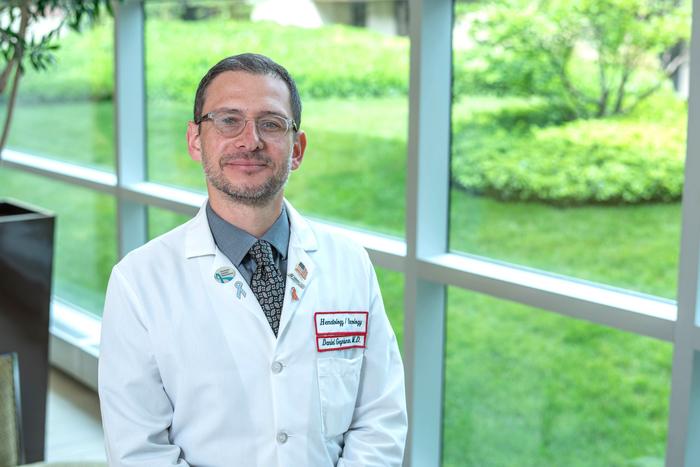PLYMOUTH MEETING, PA [May 16, 2024] — Daniel M. Geynisman, MD, is being announced as the new Editor-in-Chief for JNCCN—Journal of the National Comprehensive Cancer Network. Dr. Geynisman has a long history of working with NCCN in a variety of roles and served as medical oncology section editor for Urologic Oncology: Seminars and Original Investigations since 2018 and authored more than 130 peer-reviewed publications. He is an Associate Professor in the Department of Hematology/Medical Oncology and Chief of the Division of Genitourinary Medical Oncology at Fox Chase Cancer Center.

Credit: NCCN
PLYMOUTH MEETING, PA [May 16, 2024] — Daniel M. Geynisman, MD, is being announced as the new Editor-in-Chief for JNCCN—Journal of the National Comprehensive Cancer Network. Dr. Geynisman has a long history of working with NCCN in a variety of roles and served as medical oncology section editor for Urologic Oncology: Seminars and Original Investigations since 2018 and authored more than 130 peer-reviewed publications. He is an Associate Professor in the Department of Hematology/Medical Oncology and Chief of the Division of Genitourinary Medical Oncology at Fox Chase Cancer Center.
“We are thrilled to welcome Dr. Geynisman into this crucial position for JNCCN,” said Crystal S. Denlinger, MD, Chief Executive Officer for NCCN. “Our journal fills many important roles when it comes to oncology knowledge sharing. In addition to publishing exclusive insights and updates for the NCCN Guidelines, JNCCN publishes rigorous health services research, original investigations, and reviews addressing all aspects of cancer care delivery. Its impact factor grows every year—currently calculated at 13.4, placing it in the top 10 percent of cancer-related publications. We look forward to seeing what new heights we can reach under Dan’s leadership.”
JNCCN is dedicated to improving the quality of cancer care locally, nationally, and globally. The journal is focused on the highest quality original research in the areas of health services, outcomes, quality improvement, and policy. It is also a trusted resource for information on the NCCN Clinical Practice Guidelines in Oncology (NCCN Guidelines®).
“It is an honor to be named Editor-in-Chief for JNCCN,” said Dr. Geynisman. “Fox Chase Cancer Center was a founding Member Institution for NCCN, and the opportunity to lead JNCCN is an enormous privilege. I am excited to expand upon the legacy of practice setting guidelines and outstanding research contributions published and look forward to working with the editorial board and journal staff to continue to build and grow JNCCN as a premier destination for oncology research.”
Dr. Geynisman has a long history of advancing cancer care with NCCN, including serving as a Member on the NCCN Guidelines Panels for both Testicular Cancer and Wilms Tumor. He has reviewed abstracts for presentation at the NCCN Annual Conference, served on various NCCN grant selection committees, and was himself a past recipient of NCCN research grants through NCCN’s Oncology Research Program (ORP). He also serves as an ad hoc reviewer for multiple other journals, including New England Journal of Medicine, European Urology, Journal of Clinical Oncology, and Cancer.
Dr. Geynisman is succeeding longtime JNCCN Editor-in-Chief Margaret Tempero, MD, UCSF Helen Diller Family Comprehensive Cancer Center, who now leads the Cancer Early Detection Initiative (CEDI) at UCSF Helen Diller Family Comprehensive Cancer Center. Under her tenure, the journal emphasized molecular medicine, health services research, and principles in cancer care. It has undergone several redesigns both digitally and in print, including an ongoing shift towards increased online content with a more streamlined, modern look. Learn more about her legacy and achievements in the March issue of JNCCN.
Dr. Geynisman’s first issue as Editor-in-Chief will be published in June 2024.Visit JNCCN.org to view the newly published May issue, including an official welcome from the journal’s editorial board and staff.
# # #
About JNCCN—Journal of the National Comprehensive Cancer Network
More than 25,000 oncologists and other cancer care professionals across the United States read JNCCN—Journal of the National Comprehensive Cancer Network. This peer-reviewed, indexed medical journal provides the latest information about innovation in translational medicine, and scientific studies related to oncology health services research, including quality care and value, bioethics, comparative and cost effectiveness, public policy, and interventional research on supportive care and survivorship. JNCCN features updates on the NCCN Clinical Practice Guidelines in Oncology (NCCN Guidelines®), review articles elaborating on guidelines recommendations, health services research, and case reports highlighting molecular insights in patient care. JNCCN is published by Harborside/BroadcastMed. Visit JNCCN.org. To inquire if you are eligible for a FREE subscription to JNCCN, visit NCCN.org/jnccn/subscribe. Follow JNCCN at x.com/JNCCN.
About the National Comprehensive Cancer Network
The National Comprehensive Cancer Network® (NCCN®) is a not-for-profit alliance of leading cancer centers devoted to patient care, research, and education. NCCN is dedicated to improving and facilitating quality, effective, equitable, and accessible cancer care so all patients can live better lives. The NCCN Clinical Practice Guidelines in Oncology (NCCN Guidelines®) provide transparent, evidence-based, expert consensus recommendations for cancer treatment, prevention, and supportive services; they are the recognized standard for clinical direction and policy in cancer management and the most thorough and frequently-updated clinical practice guidelines available in any area of medicine. The NCCN Guidelines for Patients® provide expert cancer treatment information to inform and empower patients and caregivers, through support from the NCCN Foundation®. NCCN also advances continuing education, global initiatives, policy, and research collaboration and publication in oncology. Visit NCCN.org for more information.



